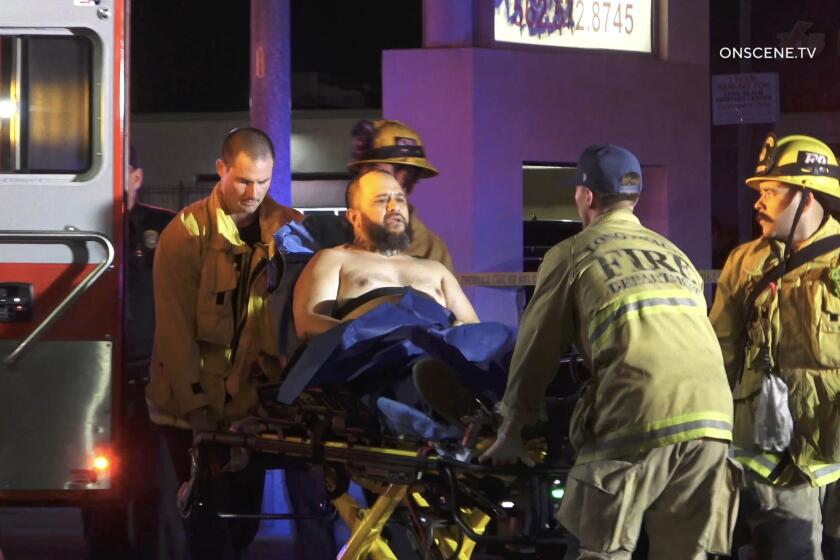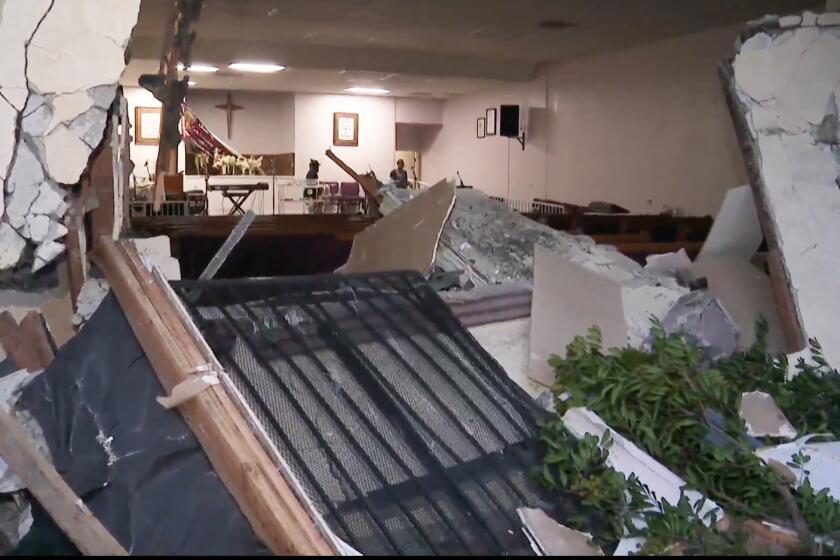Osama bin Laden’s death removes a cloud that enveloped a generation
Just as the world was opening up for Luke Watkins’ generation, one man’s face began to haunt it.
Watkins was a sixth-grader when his mother called him to a television screen where smoke was pouring from the twin towers of the World Trade Center. Accompanying the carnage were grainy images of Osama bin Laden, the sudden embodiment of a terrorist network that seemed to be everywhere and nowhere.
For Watkins, now a 20-year-old junior at UCLA, that was half a lifetime ago. It is hard to remember a time before the Al-Qaeda leader, and strange to think of a planet without him.
“There’s always been Osama bin Laden,” said Watkins, of Orange. The terrorist leader “was the face of those who wanted to hurt us, and could.”
For his generation, known as the millennials, terrorism and the American response to it created a climate of foreboding that shaped their youth. For many, the death of Bin Laden marks a defining moment as they enter adulthood.
“It feels as though that arc in American history has come to a close,” Watkins said. Acknowledging the strangeness of the analogy, he compared Bin Laden’s death to the upcoming last installment of the long-running Harry Potter movies: “It marks the end of our childhood,” he said.
The decadelong war on terror and the fears it prompted touched these young people, their families and others in concrete ways that the nuclear threat of the Cold War never did for an older generation.
Nic Cappon, a 22-year-old senior at the State University of New York at Plattsburgh, noted that restrictive airport security measures and color-coded threat levels are second nature to people his age.
“We didn’t know a time when you could bring shampoo on an airplane,” Cappon said.
Unlike Americans 20 or even 10 years older, who grew up in a time of relative peace and prosperity, young people today have spent their youth with their nation at war. They have struggled to understand a hatred so deep that people would strap bombs to themselves to kill Americans.
So, in the celebrations that followed news of Bin Laden’s death Sunday, it was the young whose faces filled the late-night crowds. Their jubilation swept through social media. Rallies, large and small, erupted from UC Davis and Stanford to Boston College, Penn State and Ohio State.
Outside the White House, the crowd chanted “USA” and, at times, in a phrase reflective of immediate concerns, “Cancel finals.”
For many, this wasn’t the death of just another bad guy, but a distant specter who had saturated their adolescence, like the Internet. His threats arrived in snippets, through translators and muffled audio. He seemed infinitely powerful — he had pierced America’s armor, after all — and impossible to reach.
He remains a figure of mystery for many.
“I still don’t know exactly who he is and what he has done,” said USC sophomore Marcus Lau, 20. “All I know is that he was the head of Al Qaeda. His death provided some closure for the victims of 9/11, but I think it’s more of a symbolic death or symbolic victory.”
Because the Sept. 11 attacks occurred at such an impressionable age for the millennials, considered to be those born after 1980, many have had a lingering sense of worry, experts say.
“They grew up with this constant pressure that something more was going to happen,” said Brian Van Brunt, director of counseling at Western Kentucky University, where students celebrated after the news of Bin Laden’s death.
The gatherings were “this massive release of tension,” as well as an attempt “to create some meaning out of it,” said Brunt, who is also president of the American College Counseling Assn.
If 9/11 helped to define childhood for many young people, “perhaps this is a celebration that it may not define their young adulthood,” said Linda DeAngelo, assistant director of UCLA’s Higher Education Research Institute.
In some ways, several of those interviewed said, Bin Laden was the figure whose threat helped create a surge of patriotism among young Americans, and fed their desire to travel and comprehend a world that suddenly seemed much larger and more complicated. He was also a “common evil” the country could unite against, much as Hitler was for the World War II generation, said Chris Carnabatu, 22, of Burbank, a fourth-year neuroscience major at UCLA.
Carnabatu understands the reasons for celebration.
“Why not?” he said. “It’s been 10 years, but we finally got him.”
Far from the threat disappearing, however, he worries that the U.S. strike at Al Qaeda may increase terrorism. “It’s like a short-term high, and then it’s going to go downhill from here,” he said.
Steven Biter, a senior at the University of Texas at Austin, grew up in Clarksville, Tenn., near Ft. Campbell, a large Army base. One result of coming of age there in an era of terrorism, said the 22-year-old sports management major, is heightened patriotism.
His sister, Erica, who is three years older, joined the Air Force after high school, served in Afghanistan and Iraq, and now is stationed in Guam. When his sister served in the war zones for a year, Biter said, he worried a lot about her: “With a sibling overseas, fighting in a war, it’s never comfortable.” But he said he was proud that “she wanted to serve her country and help protect us at home and abroad.”
After the 9/11 attacks, there was a sharp rise in support for the military among American college students, according to researchers. In surveys by the UCLA Higher Education Research Institute, 45% of college freshmen in 2002 advocated more military spending, the highest percentage in two decades. That fell to 28% in 2008, after years of war in Iraq and Afghanistan and no more major terrorism at home.
Over the same decade, students showed a greater interest in exploring the world and less fear of travel abroad. In 2002, about 21% of freshmen nationwide said they would probably study abroad, a figure that had jumped to 31.5% by 2010.
At a young age, people were confronted with media images of the world that left them wanting to learn more, particularly about the Islamic world, said Mahmoud Al-Batal, a Middle Eastern studies professor at the University of Texas at Austin.
“They are trying to understand why 9/11 happened. And they want to know what went on in the minds of the people who committed this heinous crime,” Al-Batal said.
Growing up in a remote part of Vermont, Faryn Borella did not feel personally threatened by terrorism. But she grew fascinated by the wider world after 9/11. Now a 19-year-old freshman at Occidental College who is studying diplomacy and world affairs, she is considering a career in international law.
“I want to try to stop this cycle of anti-Americanism and Islamophobia,” she said. “It is important to break the cycle in the future.”
She worries that all the celebrating may lead to retribution by terrorists. “It’s OK to be happy, but to storm the White House and Times Square and cheer may not be the best way to react,” she said.
Jason Lifton, the 22-year-old student body president of George Washington University, attended the Sunday night rally outside the White House and said it was more about marking a historical moment than celebrating a man’s death.
It was “a group of people who wanted to be together to celebrate America,” Lifton said.
Many of the same students, he said, had partied at the same place when Barack Obama won the presidency.
christopher.goffard@latimes.com
More to Read
Start your day right
Sign up for Essential California for news, features and recommendations from the L.A. Times and beyond in your inbox six days a week.
You may occasionally receive promotional content from the Los Angeles Times.








